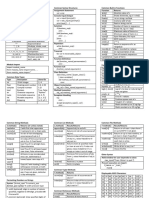0 ratings0% found this document useful (0 votes)
50 viewsPython For Beginners Cheat Sheet
The document provides information about Python programming concepts including data types, functions, classes, exceptions, file handling, and collections. It includes code snippets and explanations of topics like numeric operations, strings, Boolean logic, conditions, loops, and comprehensions.
Uploaded by
Ananda SaikiaCopyright
© © All Rights Reserved
Available Formats
Download as PDF, TXT or read online on Scribd
0 ratings0% found this document useful (0 votes)
50 viewsPython For Beginners Cheat Sheet
The document provides information about Python programming concepts including data types, functions, classes, exceptions, file handling, and collections. It includes code snippets and explanations of topics like numeric operations, strings, Boolean logic, conditions, loops, and comprehensions.
Uploaded by
Ananda SaikiaCopyright
© © All Rights Reserved
Available Formats
Download as PDF, TXT or read online on Scribd
You are on page 1/ 2
Set and mapping types (unordered):
set {'Fred', 'John'} set(('Fred', 'John'))
Function with optional arguments:
def multiply(x, y=2): multiply(3) == 6 Python
cheat sheet
frozenset frozenset(('Fred', 'John')) return x * y multiply(3, 5) == 15
dict {'Fred': 123, 42: 'John'} multiply(3, y=5) == 15
dict([('Fred', 123), (42, 'John')])
dict(Fred=123, John=42)
Classes
Immutable set methods and operations: Code structure
intersection() symmetric_difference() issubset() Simple class definition with attributes and constructor:
union() copy() issuperset() class Simple: obj = Simple(7) Grouping: Whitespace has meaning. Line breaks separate
difference() isdisjoint() x = None obj.x == 7 statements, indentation creates logical blocks. Comments
def __init__(self, x): run from # to line break. Functional units go into modules
{1, 2} & {2, 3} == {2} {1, 2} == {2, 1} self.x = x (files) and packages (directories); each source file imports
{1, 2} | {2, 3} == {1, 2, 3} {1} < {1, 2} any modules it uses:
{1, 2} - {2, 3} == {1} {1, 2} <= {1, 2} Subclass which accesses a method of its Superclass: import math
{1, 2} ^ {2, 3} == {1, 3} class XY(Simple): obj = XY(7, 9) for x in range(0, (4+1)*2): # numbers 0 <= x < 10
y = None obj.x == 7 y = math.sqrt(x)
Set mutation methods: def __init__(self, x, y): obj.y == 9 print('The square root of {} is {}'.format(
add() update() intersection_update() super().__init__(x) x, y))
pop() remove() difference_update() self.y = y
clear() discard() symmetric_difference_update() Variable names: May contain letters (unicode, case-sensi-
Class with a method that can be called on instances: tive), numerals and _.
Mapping methods and operations: class CalcZ(XY): obj = CalcZ(7, 9)
get() keys() pop() copy() def do_z(self): obj.do_z() == 63
setdefault() values() popitem() fromkeys() return self.x * self.y Logic and flow control
update() items() clear()
Class with an automatically computed attribute: Conditions: compound statement or expression:
x = {'a': 1, 'b': 2}; x['d'] = 5 class AutoZ(XY): obj = AutoZ(7, 9) if x < y: print('equal'
'b' in x == True; x['a'] == 1; del x['b'] @property obj.z == 63 print(x) if x == y
def z(self): elif x > y: else 'unequal')
List and dict comprehensions: return self.x * self.y print(y)
[2 * i for i in range(3)] == [0, 2, 4] else:
{i: i ** 2 for i in range(3)} print('equal')
== {0: 0, 1: 1, 2: 4} This cheat sheet refers to Python 3.7:
https://docs.python.org/3.7/ Iteration: over sets or until termination:
for name in ['John', 'Fred', 'Bob']:
Functions Coding style conventions according to PEP8 if name.startswith('F'):
https://python.org/dev/peps/pep-0008/ continue
Simple function definition, takes an argument of any type: print(name)
def double(x): double(2) == 4 Text by Kristian Rother, Thomas Lotze (CC-BY-SA 4.0)
return x * 2 double('abc') == 'abcabc' while input('Stop?') != 'stop':
https://www.cusy.io/de/seminare if 'x' in input('Do not type an x.'):
Function that does not explicitly return a value: print('You typed an x.')
def idle(): pass idle() == None break
else:
print('Loop finished without typing an x.')
Exceptions: for explicit error handling: Data types String methods:
try: upper() casefold() title()
if 'x' in input('Do not type an x.'): Numeric types: lower() swapcase() capitalize()
raise RuntimeError('You typed an x.') int 137 -42 1_234_567 0b1011 0o177 0x3f
except Exception as exc: float 2.71 .001 2.718_281 5.43e-10 center() ljust() rjust()
print(exc) complex 0.3j 5J (1 - 2.5j) lstrip() rstrip() strip()
else:
print('You did not type an x.') int(1) int('2_345') int('0xff') int(' 1 ') count() index() rindex() find() rfind()
finally: float(12) float('2.71') float('1.4e9')
print('Good bye.') complex('5j') complex(1, -2.3) join() partition() rpartition()
str(123.0) == '123.0'; bin(23) oct(23) hex(23) split() rsplit() splitlines()
Context managers: implicit error handling for resources:
with open('story.txt', 'w') as story: Numeric operations: replace() format() translate() expandtabs()
print('Once upon a time...', file=story) 1 + 1 == 2; 7 / 2 == 3.5; 7 // 2 == 3; 7 % 2 == 1 zfill() format_map() maketrans()
2 - 1 == 1; 2 * 3 == 6; divmod(7, 2) == (3, 1)
2 ** 3 == 8; (1 + 3j).conjugate() == 1 - 3j isdigit() isdecimal() isupper() startswith()
Built-in functions pow(2, 3) == 8; abs(-1) == 1; round(1.5) == 2 isalpha() isnumeric() islower() endswith()
isalnum() isprintable() istitle()
Input and output: Boolean type (truth values): isspace() isidentifier()
input([prompt]) open(file, ...) bool True False
print(*objects, file=sys.stdout, ...) bool(123) == True; bool(0) == False Sequence types:
tuple () (1,) (1, 'abc', 3.4)
Collections: Boolean operations: list [] [1] [1.0, 'abc', [1, 2, 3]]
iter(obj[, sentinel]) next(iterator) True and False == False; True or False == True range tuple(range(1, 4)) == (1, 2, 3)
all(iterable) filter(function, iterable) not True == False; not 42 == False; 0 or 42 == 42
any(iterable) map(function, *iterables) list('ab') == ['a', 'b']; tuple([1, 2]) == (1, 2)
max(iterable) reversed(sequence) Text (unicode) strings: (1, 1, 2).count(1) == 2; (1, 2, 3).index(3) == 2
min(iterable) sorted(iterable, ...) str 'abc' """abc""" """some
len(sequence) enumerate(iterable) "a'b'c" 'a\'b\'c' multiline Sequence and string operations, slicing:
sum(iterable[, start]) zip(*iterables) 'äbc' 'a\xfcc' 'ab\nc' string""" 'ab' * 3 == 'ababab'; [1, 2] in [0, 1, 2] == False
'ab' + 'cd' == 'abcd'; 'bc' in 'abcd' == True
Object representation: ord('A') == 65; chr(65) == 'A' (1, 2) + (3,) == (1, 2, 3); 1 in (0, 1) == True
ascii(obj) format(obj[, format_spec]) 'äbc'.encode('utf-8') == b'\xc3\xa4bc'
repr(obj) 'abc'[1] == 'b'; (1, 2, 3)[-1] == 3
String formatting: 'abcd'[1:3] == 'bc'; [1, 2][:] == [1, 2]
Object manipulation and reflection: 'Mr {name}: {age} years old.'.format( 'abcd'[1:] == 'bcd'; [1, 2][:] is not [1, 2]
dir([obj]) isinstance(obj, classinfo) name='Doe', age=42) == 'Mr Doe: 42 years old.' 'abcdefgh'[1:7:2] == 'bdf'
vars([obj]) issubclass(class, classinfo)
hasattr(obj, name) setattr(obj, name, value) name = 'Doe'; age = 42 List mutation methods and operations:
getattr(obj, name) delattr(obj, name) f'Mr {name}: {age} years' == 'Mr Doe: 42 years' append() pop() copy() sort() extend()
insert() remove() clear() reverse()
x = [1, 2]; x += [3]; x *= 2; del x[4]
del x[1:3]; x[:2] = [4, 5, 6]
You might also like
- The Absolute Basics: Basic and Intermediate Python 3 - Notes/Cheat Sheet100% (3)The Absolute Basics: Basic and Intermediate Python 3 - Notes/Cheat Sheet11 pages
- C:/Users/Rafe/Appdata/Local/Programs/Python/Python35-32/Scripts Object and Data Structures BasicsNo ratings yetC:/Users/Rafe/Appdata/Local/Programs/Python/Python35-32/Scripts Object and Data Structures Basics16 pages
- Khuzaima Zakia Kelompok 11 Tugas1 AlproNo ratings yetKhuzaima Zakia Kelompok 11 Tugas1 Alpro15 pages
- What Will Be The Output For The Following CodeNo ratings yetWhat Will Be The Output For The Following Code19 pages
- Expanded List of Additional Built-In FunctionsNo ratings yetExpanded List of Additional Built-In Functions4 pages
- Introduction To Python For Data Science 1672630478No ratings yetIntroduction To Python For Data Science 167263047814 pages
- Python 2.7 Quick Reference Sheet: ver 2.01 ʹ 110105 (sjd)No ratings yetPython 2.7 Quick Reference Sheet: ver 2.01 ʹ 110105 (sjd)2 pages
- Built-In Data Types: Setting The Data TypeNo ratings yetBuilt-In Data Types: Setting The Data Type8 pages
- Intro To Scientific Computing With PythonNo ratings yetIntro To Scientific Computing With Python87 pages
- A Brief Introduction to MATLAB: Taken From the Book "MATLAB for Beginners: A Gentle Approach"From EverandA Brief Introduction to MATLAB: Taken From the Book "MATLAB for Beginners: A Gentle Approach"2.5/5 (2)
- Git Cheat Sheet: Presented by Tower - The Best Git Client For Mac and WindowsNo ratings yetGit Cheat Sheet: Presented by Tower - The Best Git Client For Mac and Windows2 pages
- Hands-On Workshop On LinkedIn & Github - GDSCAKUNo ratings yetHands-On Workshop On LinkedIn & Github - GDSCAKU5 pages
- Nanocom Evolution Software Hardware ManualNo ratings yetNanocom Evolution Software Hardware Manual19 pages
- Dessalew Antigegn Chekol - HouseholddatacollectorNo ratings yetDessalew Antigegn Chekol - Householddatacollector12 pages
- Technical Communication Omnipcx Enterprise: Date: 24 August 2012No ratings yetTechnical Communication Omnipcx Enterprise: Date: 24 August 201232 pages
- Bank Integration With Fusion Application Is Important For Inbound and Outbound InterfaceNo ratings yetBank Integration With Fusion Application Is Important For Inbound and Outbound Interface11 pages
- Ibps RRB Po Memory Based Questions Discussion 5th Aug 2023 English 611685760538582No ratings yetIbps RRB Po Memory Based Questions Discussion 5th Aug 2023 English 61168576053858233 pages
- AWS Certified Solutions Architect Associate SAA C03 Exam 271123No ratings yetAWS Certified Solutions Architect Associate SAA C03 Exam 271123333 pages
- Learning Outcomes: LO1 Analyse The Information Requirements of OrganisationsNo ratings yetLearning Outcomes: LO1 Analyse The Information Requirements of Organisations37 pages
- (Ebook) Modular Synthesis: Patching Machines and People by Ezra J. Teboul, Andreas Kitzmann, Einar Engström ISBN 9781040015759, 9781003219484, 1040015751, 1003219489 2024 scribd download100% (3)(Ebook) Modular Synthesis: Patching Machines and People by Ezra J. Teboul, Andreas Kitzmann, Einar Engström ISBN 9781040015759, 9781003219484, 1040015751, 1003219489 2024 scribd download81 pages
- Notice: Government Engineering College, Devagiri, Haveri Department of Electronics & CommunicationNo ratings yetNotice: Government Engineering College, Devagiri, Haveri Department of Electronics & Communication5 pages
- Technical Information Technical Information: Zeus MLKNo ratings yetTechnical Information Technical Information: Zeus MLK14 pages
- Data That Delivers: GOV TRIBE Opportunity SearchNo ratings yetData That Delivers: GOV TRIBE Opportunity Search3 pages
- O-CAPS-01: Pre-Regional Mathematics Olympiad (PRMO) : Olympiad-Classroom Assessment Practice SheetNo ratings yetO-CAPS-01: Pre-Regional Mathematics Olympiad (PRMO) : Olympiad-Classroom Assessment Practice Sheet15 pages



































































































